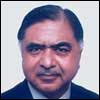|
When in November 1981, Kamal Hossain challenged Justice Abdus Sattar for the presidency of Bangladesh, there were many among us who truly believed that he had a good chance of taking charge of the country. In the event, he lost. But that did not in any way diminish Kamal Hossain's hold on the popular imagination.
If anything, in these past many years, he has in a way been transformed into an effective moral voice for the country. His opinions on the issues that matter, his presence on the national and global stage, all of these have reinforced our feeling that this man of the law also happens to be our point of reference on all other matters which exercise our imagination.
Perhaps one of the sadder truths of our era is that Dr Kamal Hossain is the last of a generation of committed Bengali politicians who reshaped the historical landscape in our part of the world in the tumultuous times between the mid-1960s and early 1970s.
All the men who served with him, who were inspired by the charismatic, purposeful leadership of Bangabandhu Sheikh Mujibur Rahman, have gone to their graves, all in tragic circumstances.
Maybe he would have met a similar fate had circumstances been less than propitious for him. It was pure chance that on the day Bangabandhu was murdered in 1975, Kamal Hossain, as a dynamic young foreign minister of Bangladesh, was away on a trip to Europe.
He chose not to return home when he heard of the bloodbath that claimed the life of the nation's founding father. Despite the insistent calls made to him by the usurper regime of Khondokar Moshtaque to come home and serve in that cabal, he stayed away from the country.
He was to remain in self-exile for a number of years, utilizing his time in intellectual and academic pursuits at places like Oxford. When he did return, in the Zia years, it was clear that he meant to bring about the changes so necessary for a nation yet in a state of shock over the assassinations, between August and November 1975, of Bangabandhu and the four leaders of the Mujibnagar government.
It was a fractious, faction-ridden Awami League he confronted on coming back home. It then fell upon him to work out a miracle, to make the old party functional again. He suggested that the self-exiled Sheikh Hasina, elder daughter of the Father of the Nation, be brought back home and asked to provide leadership to the Awami League.
The rest is history. And history is also what you spot in the way Kamal Hossain's fortunes have fluctuated in all the decades since he stepped into politics more than four decades ago.
He was one of those bright young men, along with Rehman Sobhan, Anisur Rahman and Nurul Islam, who were to play a pivotal role in the shaping of the Bengali nationalist struggle.
|
|
As legal counsel to Sheikh Mujibur Rahman in the Agartala Conspiracy Case, Kamal Hossain demonstrated the finesse that would soon have him elevated to the position of constitutional adviser to the chief of the Awami League. It was a job he did extremely well in the difficult, and eventually abortive, negotiations between the Awami League and the Yahya Khan junta in March 1971.
When the negotiations collapsed, and the Pakistan army went on a spree of genocide all across occupied Bangladesh, it was expected that Kamal Hossain would take, like so many others, the beaten, tortuous paths to exile and ultimate armed struggle for national liberty. He did not, or could not.
Rehman Sobhan and Amirul Islam left a fearsome Dhaka without him. On a day in early April, the Pakistan military authorities informed a depressed Bengali nation that Kamal Hossain had been taken into custody. And then he was heard of no more, not that day, not in the nine months of the war that would claim the lives of three million Bengalis.
Rumours about Kamal Hossain, none of them complimentary to him, abounded, though. MR Akhtar Mukul spent the entirety of the war castigating Kamal Hossain over Shwadhin Bangla Betar about his alleged cooperation with the Yahya regime in Rawalpindi. He had, it was insinuated, gone over to the enemy to undermine the incarcerated Bangabandhu.
Ironically, it was Bangabandhu who first informed us of the courageous stand Kamal Hossain had taken in his state of imprisonment in Pakistan. Pressure, psychological and systematic, was exercised on the young lawyer to repudiate the undisputed leader of the Bengali nation before the military tribunal trying him for treason.
To his everlasting credit, Kamal Hossain spurned all such suggestions. On January 8, 1972, it was a free Kamal Hossain, along with his family, who accompanied a liberated Bangabandhu Sheikh Mujibur Rahman to London.
A new phase in his life, in the history of the country he was returning to, had begun. Over the next twelve months, as minister for law in Bangabandhu's government, Kamal Hossain was to preside over the drafting and eventual adoption of a constitution for the People's Republic of Bangladesh. It was his finest hour.
As Kamal Hossain rounds off seventy years of his life, a grateful Bengali nation recalls all his contributions and remembers, too, all the travails he has been through in these past many years. He could have been a great president; he has always had the potential to be a modern head of government. Then again, it is just as well that he has been neither of these that he has regularly served as our voice of conscience. That is the tribute he deserves, and gets, this morning.
See all the Daily Star press reports >
|














